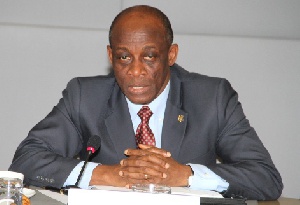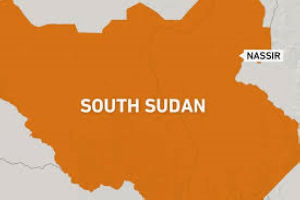Finance Minister Seth Terkper has expressed hope that a milestone agreement reached with creditors over VRA’s debts will be enough to ease holdup in discussions with the International Monetary Fund (IMF) over the ongoing bailout programme.
The Minister, on Wednesday, told the press at a meeting also attended by bigshots of the banks the VRA owes, that the deal agreed will see government pay about GHC250 million in the coming days.
The statement of the Finance Minister, which has received backing from the banks, is expected to post a message of assurance to the Bretton-wood’s institution to relax its stance on seeing government take a decisive action on resolving the chain of debts that has engulfed the energy sector.
The Washington-based lender is keen on seeing that government develops a strategy to manage the huge debt accumulated by VRA over the years, as well as that of other state-owned enterprises (SOEs) in the energy sector, before the next tranche of the US$918 million Extended Credit Facility (ECF) is disbursed.
The IMF Mission chief for Ghana, Joel Toujas-Bernate, said discussions between the Fund and government are ongoing to ascertain that financial pressures in SOEs in the energy sector will not pose additional risks to the central government budget.
Talks on a third review is long overdue and the Fund is hopeful that a quick and positive conclusion of some actions it wants the government to pursue will lead to the third programme review to be considered by the IMF Executive Board around mid-September.
But the Finance Minister, speaking at a press briefing in Accra, said: “acting prudently and responsibly, the government is stepping in along with other stakeholders to create an enabling environment to ensure coordinated restructuring and repayments of these legacy debts with agreement in principle now reached with the banks.”
The VRA is indebted to about 11 commercial banks to the tune of more than GHS4 billion – out of which the current debt agreement reached with the banks with the backing of government is aimed at resolving GHS2.2 billion of the total amount.
According to Mr. Terkper, the state-owned energy sector firms are now faced with financial challenges which have affected their viability thereby necessitating a restructuring and priority repayments via special energy levies, automatic tariff adjustments and elimination of subsidies.
The upfront payment, he said, will be funded by the collections from the energy sector levy which was passed earlier this year and saw hikes in prices of petroleum products as well as utilities.
Another key feature of the deal agreed with the banks is a reduction on the interest rate on the cedi component of the VRA debt from 30 percent to 22 percent whereas interest on the foreign debt component was successfully negotiated from 11 percent to 8.5 percent.
“Repayments will be funded from a debt service account which will receive cashflows from the energy debt recovery levy and a debt service reserve and a proportion of VRA's receivables. Also, proceeds of the energy debt recovery levy which are applied to VRA debts will be converted into equity on VRA's balance sheet or could be subject to an on-lending arrangement with the government,” the Minister said.
Mr. Terkper, who is also the acting Power Minister, said government will place a moratorium on the ability of VRA, which runs the Akosombo Hydro dam as well as other thermal power plants with a generation capacity in excess of 2,000MW, to incur new debts without government’s approval.
“The government anticipates that this approach will be used to restructure VRA as well as the debt of other energy-sector SOEs,” the Minister said.
President of the Ghana Association of Bankers (GAB) Alhassan Andani told the B&FT on the sidelines of the press briefing that the banks are confident in the new arrangement made by government.
He said the move will ease the pressure exerted on the balance sheets by the VRA debt adding that banks will not hesitate to do business with VRA as long as the conditions remain favourable to the banks.
Business News of Thursday, 1 September 2016
Source: B&FT













